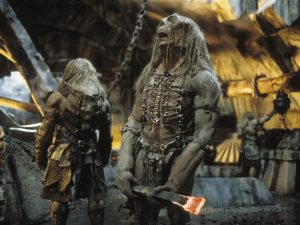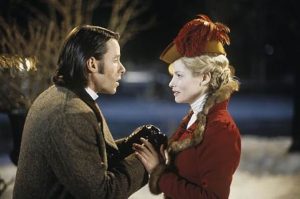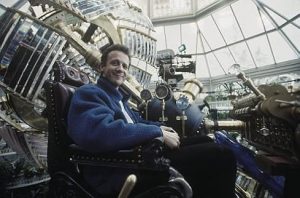The Time Machine (2002)

“The Time Machine” is a 2002 science fiction film directed by Simon Wells, based on H.G. Wells’ classic 1895 novel of the same name. Starring Guy Pearce, Samantha Mumba, Mark Addy, and Jeremy Irons, this modernized adaptation blends adventure, romance, and speculative fiction.

The plot follows Dr. Alexander Hartdegen (Guy Pearce), a scientist and inventor living in New York City at the turn of the 20th century. Unlike the original novel’s unnamed protagonist, Alexander is driven by a personal tragedy: the murder of his fiancée, Emma (Sienna Guillory). Obsessed with changing the past, Alexander constructs a visually impressive time machine and travels back to the moment before Emma’s death. Despite his efforts, he finds that altering her fate is impossible, as she dies in different ways no matter what he does. This realization leads him to question the nature of time and destiny.

Seeking answers, Alexander propels himself into the distant future, arriving in the year 2030. There, he learns about technological and societal advances, but another tragedy forces him to escape even further into the future. Eventually, he lands in the year 802,701, discovering a world divided between the peaceful, surface-dwelling Eloi and the monstrous, subterranean Morlocks.
Alexander befriends Mara (Samantha Mumba) and her younger brother, Kalen (Omero Mumba), members of the Eloi, who live in fear of the Morlocks. Determined to help, Alexander explores the ruins of human civilization and uncovers the catastrophic events that led to humanity’s division.

The climax involves Alexander’s confrontation with the leader of the Morlocks, the Uber-Morlock (Jeremy Irons), a highly intelligent and telepathic being who explains that the Morlocks control the Eloi through fear and selective breeding. Alexander realizes that the Uber-Morlock represents a dark reflection of humanity’s potential future.
In a final act of defiance, Alexander sabotages his time machine, causing a massive explosion that destroys the Morlocks’ underground lair. He sacrifices his ability to return to his own time but secures a hopeful future for the Eloi. The film concludes with Alexander choosing to live among the Eloi, embracing a new life and leaving behind his tragic past.

“The Time Machine” explores themes of loss, destiny, and the consequences of technological advancements. While praised for its visual effects and the creative design of the time machine and future world, the film received mixed reviews from critics. Some appreciated its ambition, while others criticized its deviations from the source material and handling of complex themes.
Despite its reception, “The Time Machine” remains a notable adaptation of H.G. Wells’ work, bringing the timeless story of time travel and human evolution to a new generation with a blend of action, drama, and speculative imagination.